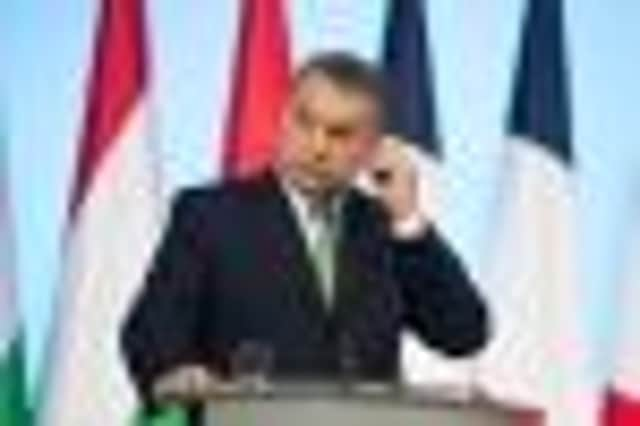Hungary’s Viktor Oban advises neighbours on Brussels


Addressing an audience at Warsaw University following a meeting of regional heads of state in the Polish capital, Viktor Orban said it was time for the countries of central and eastern Europe to move on and not live in awe of the West, given the dire state of the eurozone.
“Today the eurozone is experiencing much more trouble than the Hungarian economy,” he said in a speech that will further enshrine Mr Orban’s status as an arch-critic of the European Union.
Advertisement
Hide AdAdvertisement
Hide Ad“In the past, it was advisable to seek solutions from Western economies, but that was when we were in transition. Today we do not need to do that.
“The countries of central and eastern Europe should make their own policies without looking to the EU. We do not have to listen to everything the bureaucrats in Brussels say.”
By calling for the old Warsaw-Pact countries to take a more independent line with Brussels, Mr Orban was manifesting a political undercurrent of prickly nationalism present in many of the “new” EU countries that has, at times, put them at odds with Brussels.
In the past, the Hungarian prime minister has compared the EU to the Soviet Union and warned that it could undermine national independence and democracy. Similar views have come from other central European leaders such as Vaclav Klaus, the Czech president who left office this week.
These views have sometimes caused consternation in Brussels and prompted claims central Europe is riddled with the old-fashioned nationalism seen in Europe between the wars.
Mr Orban’s comments also come just days after Romania warned European leaders that excluding it and Bulgaria from the Schengen zone could lead to parallels with the old iron curtain that once divided Europe.
Germany has threatened to veto the two countries joining the zone unless they improve the fight against corruption. But many in the two EU countries believe that the talk of corruption is being used to mask Western fears that hundreds of thousands of Bulgarians and Romanians might exploit the Schengen zone to escape grinding poverty at home.
The exclusion of the two countries from the passport-free zone could re-enforce a widespread perception in the east that some central European countries have a second-class status in the EU.
Advertisement
Hide AdAdvertisement
Hide Ad• Meanwhile, hundreds of opponents of outgoing Czech president Vaclav Klaus marched yesterday in Prague to pour scorn on him on his final day in office.
Mr Klaus, whose presidency ended yesterday, polarised the public with his strident views questioning the EU, gay rights and global warming.